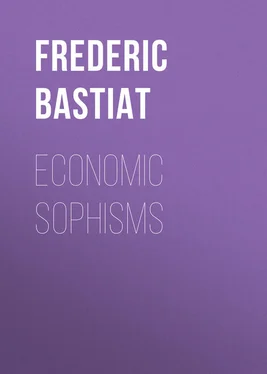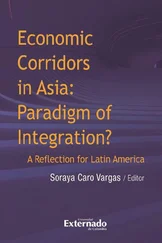Frederic Bastiat - Economic Sophisms
Здесь есть возможность читать онлайн «Frederic Bastiat - Economic Sophisms» — ознакомительный отрывок электронной книги совершенно бесплатно, а после прочтения отрывка купить полную версию. В некоторых случаях можно слушать аудио, скачать через торрент в формате fb2 и присутствует краткое содержание. ISBN: , Жанр: foreign_antique, foreign_prose, на английском языке. Описание произведения, (предисловие) а так же отзывы посетителей доступны на портале библиотеки ЛибКат.
- Название:Economic Sophisms
- Автор:
- Жанр:
- Год:неизвестен
- ISBN:http://www.gutenberg.org/ebooks/44145
- Рейтинг книги:3 / 5. Голосов: 1
-
Избранное:Добавить в избранное
- Отзывы:
-
Ваша оценка:
- 60
- 1
- 2
- 3
- 4
- 5
Economic Sophisms: краткое содержание, описание и аннотация
Предлагаем к чтению аннотацию, описание, краткое содержание или предисловие (зависит от того, что написал сам автор книги «Economic Sophisms»). Если вы не нашли необходимую информацию о книге — напишите в комментариях, мы постараемся отыскать её.
Economic Sophisms — читать онлайн ознакомительный отрывок
Ниже представлен текст книги, разбитый по страницам. Система сохранения места последней прочитанной страницы, позволяет с удобством читать онлайн бесплатно книгу «Economic Sophisms», без необходимости каждый раз заново искать на чём Вы остановились. Поставьте закладку, и сможете в любой момент перейти на страницу, на которой закончили чтение.
Интервал:
Закладка:
"Every one must wish, for his own sake, as well as for the sake of others, that the production of the country should be protected against foreign competition, whenever the latter can furnish products at a lower price. " 10 10 Matthieu le Dombasle.
This argument recurs continually in works of the protectionist school. I propose to examine it carefully, and I solicit earnestly the reader's patience and attention. I shall consider, first of all, the inequalities which are attributable to nature, and afterwards those which are attributable to diversity of taxation.
In this, as in other cases, we shall find protectionist theorists viewing their subject from the producer's stand-point, whilst we advocate the cause of the unfortunate consumers, whose interests they studiously keep out of sight. They institute a comparison between the field of industry and the turf . But as regards the latter, the race is at once the means and the end . The public feels no interest in the competition beyond the competition itself. When you start your horses, your end , your object, is to find out which is the swiftest runner, and I see your reason for equalizing the weights. But if your end , your object, were to secure the arrival of some important and urgent news at the winning-post, could you, without inconsistency, throw obstacles in the way of any one who should offer you the best means of expediting your message? This is what you do in commercial affairs. You forget the end, the object sought to be attained, which is material prosperity; you disregard it, you sacrifice it to a veritable petitio principii ; in plain language, you are begging the question.
But since we cannot bring our opponents to our point of view, let us place ourselves in theirs, and examine the question in its relations with production.
I shall endeavour to prove,
1st, That to level and equalize the conditions of labour, is to attack exchange in its essence and principle.
2d, That it is not true that the labour of a country is neutralized by the competition of more favoured countries.
3d, That if that were true, protective duties would not equalize the conditions of production.
4th, That liberty, freedom of trade, levels these conditions as much as they can be levelled.
5th, That the least favoured countries gain most by exchange.
I. To level and equalize the conditions of labour is not simply to cramp exchanges in certain branches of trade, it is to attack exchange in its principle, for its principle rests upon that very diversity, upon those very inequalities of fertility, aptitude, climate, and temperature, which you desire to efface. If Guienne sends wine to Brittany, and if Brittany sends corn to Guienne, it arises from their being placed under different conditions of production. Is there a different law for international exchanges? To urge against international exchanges that inequality of conditions which gives rise to them, and explains them, is to argue against their very existence. If protectionists had on their side sufficient logic and power, they would reduce men, like snails, to a state of absolute isolation. Moreover, there is not one of their sophisms which, when submitted to the test of rigorous deductions, does not obviously tend to destruction and annihilation.
II. It is not true, in point of fact , that inequality of conditions existing between two similar branches of industry entails necessarily the ruin of that which is least favourably situated. On the turf, if one horse gains the prize, the other loses it; but when two horses are employed in useful labour, each produces a beneficial result in proportion to its powers; and if the more vigorous renders the greater service, it does not follow that the other renders no service at all. We cultivate wheat in all the departments of France, although there are between them enormous differences of fertility; and if there be any one department which does not cultivate wheat, it is because it is not profitable to engage in that species of culture in that locality. In the same way, analogy shows us that under the regime of liberty, in spite of similar differences, they produce wheat in all the countries of Europe; and if there be one which abandons the cultivation of that grain, it is because it is found more for its interest to give another direction to the employment of its land, labour, and capital And why should the fertility of one department not paralyze the agriculturist of a neighbouring department which is less favourably situated? Because the economic phenomena have a flexibility, an elasticity, levelling powers , so to speak, which appear to have altogether escaped the notice of the protectionist school. That school accuses us of being given up to system; but it is the protectionists who are systematic in the last degree, if the spirit of system consists in bolstering up arguments which rest upon one fact instead of upon an aggregation of facts. In the example which we have given, it is the difference in the value of lands which compensates the difference in their fertility. Your field produces three times more than mine. Yes, but it has cost you ten times more, and I can still compete with you. This is the whole mystery. And observe, that superiority in some respects leads to inferiority in others. It is just because your land is more fertile that it is dearer; so that it is not accidentally , but necessarily , that the equilibrium is established, or tends to be established; and it cannot be denied that liberty is the regime which is most favourable to this tendency.
I have referred to a branch of agricultural industry; I might as well have referred to industry in a different department. There are tailors at Quimper, and that does not hinder there being tailors also in Paris, though the latter pay a higher rent, and live at much greater expense. But then they have a different set of customers, and that serves not only to redress the balance, but to make it incline to their side.
When we speak, then, of equalizing the conditions of labour, we must not omit to examine whether liberty does not give us what we seek from an arbitrary system.
This natural levelling power of the economic phenomena is so important to the question we are considering, and at the same time so fitted to inspire us with admiration of the providential wisdom which presides over the equitable government of society, that I must ask permission to dwell upon it for a little.
The protectionist gentlemen tell us: Such or such a people have over us an advantage in the cheapness of coal, of iron, of machinery, of capital – we cannot compete with them.
We shall examine the proposition afterwards under all its aspects. At present, I confine myself to the inquiry whether, when a superiority and an inferiority are both present, they do not possess in themselves, the one an ascending, the other a descending force, which must ultimately bring them back to a just equilibrium.
Suppose two countries, A and B. A possesses over B all kinds of advantages. You infer from this, that every sort of industry will concentrate itself in A, and that B is powerless. A, you say, sells much more than it buys; B buys much more than it sells. I might dispute this, but I respect your hypothesis.
On this hypothesis, labour is much in demand in A, and will soon rise in price there.
Iron, coal, land, food, capital, are much in demand in A, and they will soon rise in price there.
Contemporaneously with this, labour, iron, coal, land, food, capital, are in little request in B, and will soon fall in price there.
Nor is this all. While A is always selling, and B is always buying, money passes from B to A. It becomes abundant in A, and scarce in B.
Читать дальшеИнтервал:
Закладка:
Похожие книги на «Economic Sophisms»
Представляем Вашему вниманию похожие книги на «Economic Sophisms» списком для выбора. Мы отобрали схожую по названию и смыслу литературу в надежде предоставить читателям больше вариантов отыскать новые, интересные, ещё непрочитанные произведения.
Обсуждение, отзывы о книге «Economic Sophisms» и просто собственные мнения читателей. Оставьте ваши комментарии, напишите, что Вы думаете о произведении, его смысле или главных героях. Укажите что конкретно понравилось, а что нет, и почему Вы так считаете.












